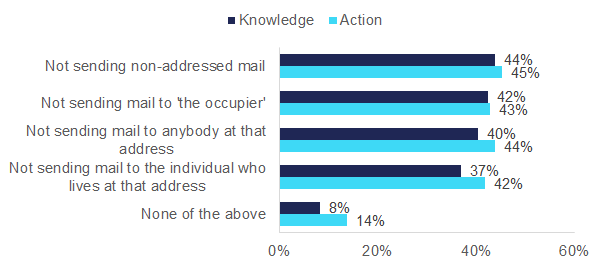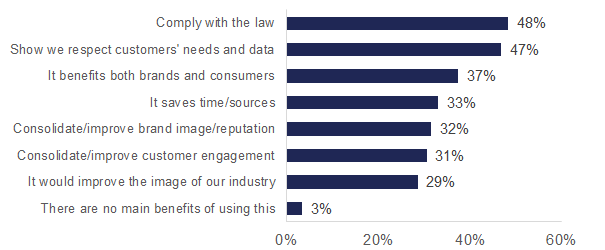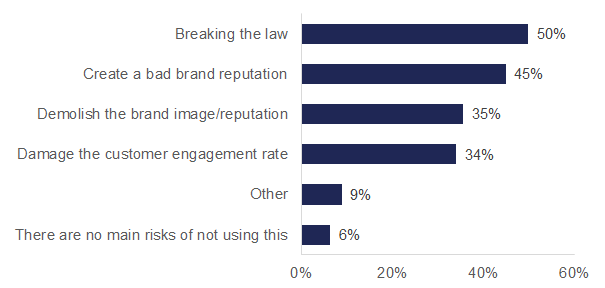MPS: What Marketers Say
20 Dec 2021

Welcome to this short article series dedicated to the Mailing Preference Service (MPS).
The MPS was developed by the DMA in 1983, funded by licence revenue and ASBOF. Despite not being a legal regulation, it’s a requirement under the DMA and CAP codes (respectively).
The MPS is a service that enables marketers set standards of best practice and code of conduct within the advertising mail industry and allow businesses to respect their consumers. It also saves companies time and resources sending marketing messages that are not welcome.
In other words, the MPS is a win-win service, for both consumers and businesses who are keen to save time and energy as well as interested in building valuable relationships.
This article focuses on the findings of a survey conducted in July 2021 with over 200 UK marketers - further details can be found in the ‘Methodology’ section at the end of this article. We asked them about their knowledge and thoughts of the mail preferences and the MPS to gather insights from their direct experience and inspire future development.
As listening to both sides of a story is key when you want to learn how you can improve, we asked consumers to also share their experiences – read the article here.
Mail Preference Service - Knowledge
The majority of marketers (86%) say they are aware of the legal requirements around mail.
On the other hand, only 77% are aware of MPS service and an even smaller number actually use them (62%).
Which of the following options do you think can be considered as a best practice for marketing mail opt-out, if any?

About 4 in 10 marketers (37%-44%) are aware of the marketing mail opt-out best practices and data show similar results for those who actually put these in practice (42%-45%).
Mail Preference Service - Experience
Among the given reasons for using the MPS service, more than half of marketers selected showing customers they respect their needs and data (56%). In addition, many (45%) also cite having a more efficient contact strategy and avoiding a waste of sources as a key reason to use the service.
Similar factors have been highlighted as the main benefits of using the MPS service. Indeed, when looking at the service’s winning points, half of the marketers who use the MPS, recognise it allows their business to be compliant with the law (48%), respect customers’ needs, and data (47%) and it actually benefits both consumers and the brand (37%).
What would you say are the main benefits of using MPS?

Marketers also believe that by not using the MPS’s service, their organisation might be breaking the law (50%). Beyond that, concerns about creating a bad (45%) or demolishing (35%) a brand’s existing reputation are of high concern – as well as damage their customer engagement rate (36%).
What would you say are the main risks of not using MPS?

However, marketers who use the MPS’s service, are concerned that they might lose potential consumers (52%), face excessive costs related to data processing (44%) as well as not meet legal requirements (44%).
On the other hand, marketers whose business doesn’t use the MPS service justify their company’s decision by saying they don’t send any unsolicited mail (62%) or have other opt-out procedures in place (29%).
What’s in it for the business?
To summarise, the benefits the MPS offers to marketers that decide to register their businesses:
- Set standards of best practice and code of conduct within the advertising mail industry
- Ensuring trust with their consumer by contacting them on their terms
- Save their business time and money
- Reduce waste
Over the year the MPS have collected over 6.5 million registrants and helped reduce the receipt of unsolicited mail. Such great achievement has been recognised by the Advertising Standards Authority (ASA) and it’s fully supported by the Information Commissioner’s Office (ICO).
As mentioned in the introduction, we also asked customers to share their perspective with us – here you can read the dedicated article.
If this article has left you keen to learn more about the MPS and what it can offer, visit the website.
Furthermore, the IDM has the perfect course in case you are interested in getting a greater understanding of data protection, privacy and responsible marketing:
Responsible Marketing: Privacy, compliance and the law
Methodology
The research was conducted in July 2021 via an online survey of 203 marketers. The respondents were working in Senior roles (29%), Mid-level (50%) and Junior (22%) roles.
Further details on their organisations:
- Region: 10% East of England, 29% Greater London, 8% East Midlands, 12% West Midlands, 3% North East, 11% North West, 5% Scotland, 7% South East, 5% South West, 3% Wales, 6% Yorkshire and the Humber
- Business size: 38% Large (250+ employees), 40% Medium (50-250 employees), 16% Small (10-49 employees), 6% Micro (1-9 employees)
- Business type: 31% B2B, 33% B2C, 36% Both
- Sector: 40% working in the Advertising and Marketing sector and the remaining 60% working in other sectors.
The data was collected by Census Wide then analysed by the DMA Insight team. The article was written and designed by the DMA Insight department. Unless referenced, all data included in this article is taken from this survey.
If you have any questions about the methodology used in the article, you can contact the DMA’s Insight team via email: research@dma.org.uk.




Please login to comment.
Comments